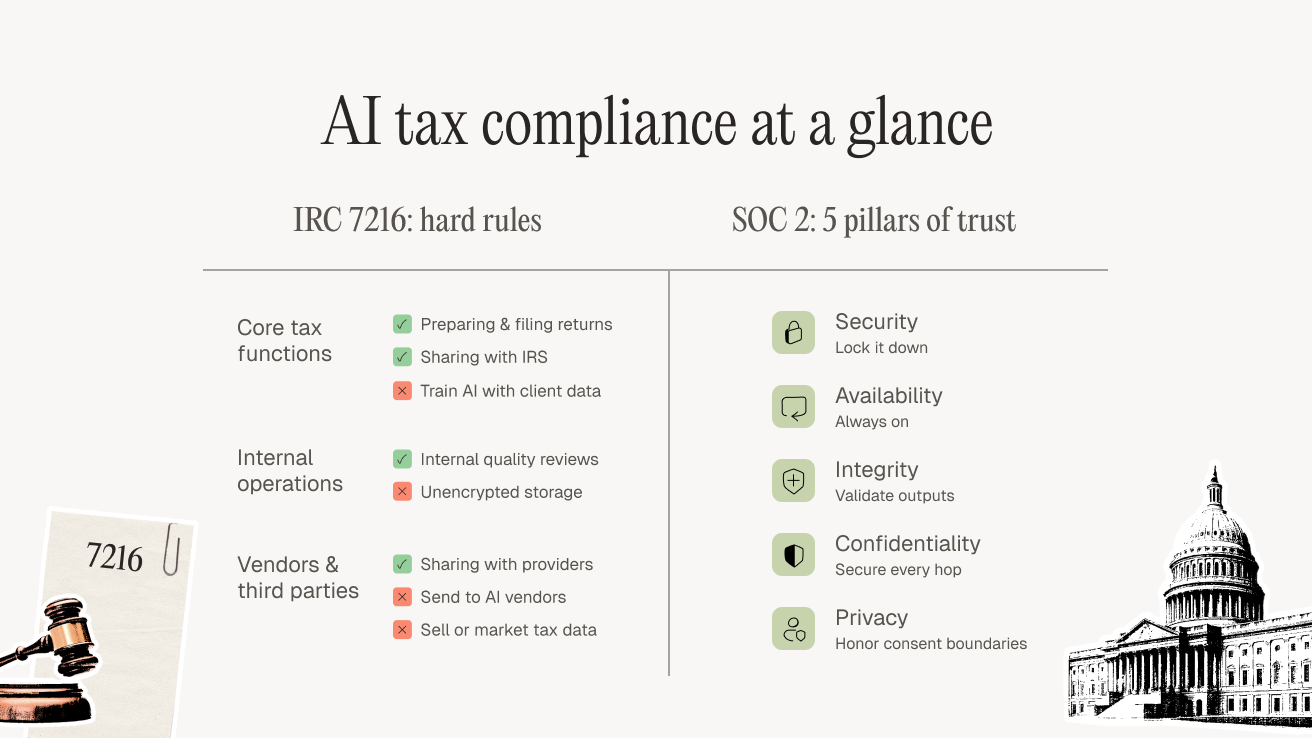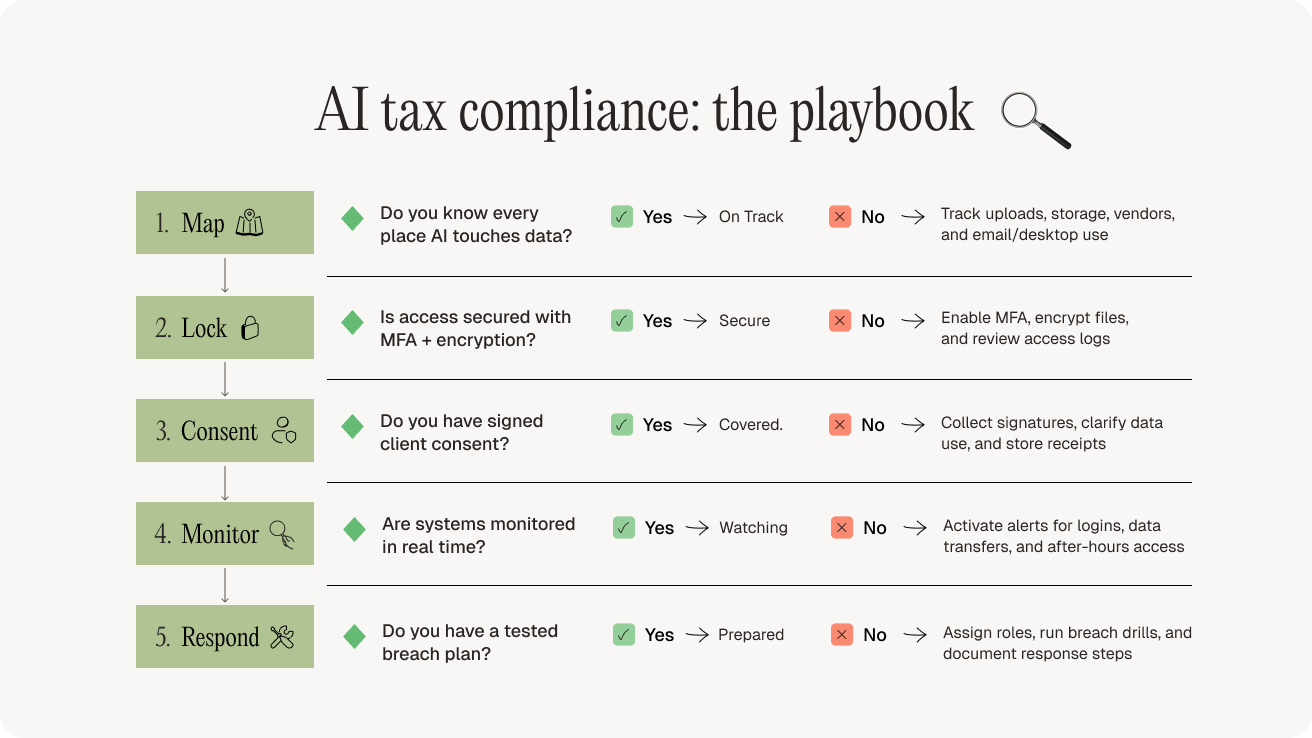AI now touches nearly every piece of client data, including Social Security numbers, income statements, and bank records. That means more efficiency, but it also means more exposure. Every new system in your workflow is another potential crack out of which sensitive data could leak.
Two rules matter most here:
- SOC 2: Keeps your systems honest and your controls tight.
- IRC Section 7216: Keeps you out of fines, lawsuits, and jail.
This isn’t theory. Breaches are rising. The IRS has no patience, and clients have even less. This checklist shows how to stay compliant while putting AI to work in your firm.

Why SOC 2 and IRC 7216 matter in AI tax workflows
Although SOC 2 and 7216 weren’t written for AI, they now define how AI fits into tax prep.
- SOC 2: The accounting profession’s standard for system security, availability, processing integrity, confidentiality, and privacy.
- IRC 7216: Federal law that tells preparers exactly what they can and can’t do with client data.
Break either and you risk:
- Breaches when data jumps between platforms
- Centralized stores of client data becoming a single point of failure
- Penalties, lawsuits, and reputational damage you don’t bounce back from
AI doesn’t reduce these risks. If you’re sloppy, it multiplies them.
IRC section 7216: the hard rules
7216 is simple. Client data is for preparing tax returns, period. Anything else requires explicit written consent.
Allowed under IRC section 7216:
- Preparing and filing tax returns
- Sharing with the IRS
- Internal quality reviews
- Sharing with software providers under proper agreements
Not allowed:
- Handing data to AI vendors without consent
- Using client data to train your model
- Selling or marketing based on tax data
- Storing unencrypted files in unauthorized systems
Penalties:
- Criminal fines up to $1,000 per offense and up to a year in jail
- Civil penalties of $250 per violation, up to $10,000 annually per preparer
Consent forms must spell out:
- What data is used
- Who touches it
- Why it’s used
- Expiration date
- That signing is voluntary
And yes, you must keep them for three years. No shortcuts.
SOC 2 principles for tax firms using AI
SOC 2 runs on five pillars. Apply them ruthlessly:
- Security: Lock it down. MFA, encryption, access logs. No exceptions.
- Availability: AI won’t save you if systems go dark in March. Keep backups, practice redundancy, and use uptime monitoring. Test it.
- Processing Integrity: AI outputs need validation. Test them against real-world returns, not dummy data. And keep all audit trails.
- Confidentiality: Utilize role-based access and data segregation. Every system hop is a risk, so secure each one.
- Privacy: Collect only data that’s needed. Honor consent boundaries. Don’t hoard data just because AI makes it easy.
The compliance checklist: your playbook

- Map your data flow. Document where AI touches tax data, like uploads, extraction, storage, and third-party vendors. Don’t forget “temporary” storage like email or desktop folders.
- Lock down access. Enforce MFA, encrypt everything, keep logs, and review them. If you can’t prove who accessed data and when, you’re exposed.
- Get explicit consent. If AI touches client data, get signatures up front. Spell out what the system does, who sees it, and why. Keep the receipts.
- Monitor constantly. Watch for alerts for failed logins, large transfers, and access after hours. If you’re not watching in real time, you’re already behind.
- Drill breach response. Have a plan. Know who locks down systems, who calls clients, and who files reports. Run practice drills. Chaos is not a strategy.
Onshore vs offshore AI processing
Where data is processed matters. Offshore use isn’t banned, but it’s a minefield.
- Consent: Offshore requires explicit disclosure
- Data transfer: More layers of security
- Jurisdiction: Good luck enforcing U.S. laws overseas
- Monitoring: Harder to audit
Even cloud servers outside the U.S. count as offshore. If your vendor won’t tell you where the data lives, assume the worst.
Data breaches: when, not if
Breaches happen in the cracks. When they do, responding with speed is everything. Take these steps:
- Notify fast. IRS Office of Safeguards, state regulators. Some states demand notice within 15 days.
- Document everything. What happened, what data, what you did. Keep detailed records.
- Fix it. Update controls, close the gap, and renegotiate vendor agreements if necessary.
Delay, and you’re compounding the damage legally and reputationally.
Compliance while scaling
Growth multiplies risk. More staff can mean more systems and more cracks. Stay ahead by:
- Automating monitoring
- Training staff regularly
- Keeping procedures documented and enforced
- Vetting every vendor — no black boxes allowed
Filed was built with security in mind. It’s AI tax prep that moves returns faster while keeping SOC 2 and 7216 compliance baked in.
Building trust with secure AI tax prep
Compliance isn’t a box you check once. It’s ongoing. Technology shifts, laws update, and threats evolve. The firms that take this seriously will win client trust, and that’s the currency that actually matters.
At Filed, security is at the core of everything we do. We’re SOC 2 compliant, and all data is stored on secure servers managed by Microsoft Azure. To protect your clients’ information, we anonymize all sensitive documents and personally identifiable information (PII) before processing. This ensures that PII is never visible to our models or to our internal teams, keeping your data—and your clients’ trust—fully protected.
Filed makes compliance practical. Fast returns, protected data, audit-ready trails. That’s how you scale without risking your license.
Apply for early access at https://www.filed.com/early-access.
FAQs about AI tax security and compliance
What penalties come with 7216 violations?
Up to $1,000 and a year in jail per offense, plus $250 civil fines per violation (capped at $10,000 annually).
How often should firms review AI security measures?
At least annually—and every time you add or change an AI tool.
What consent language is required?
Be explicit: what data, how it’s used, who touches it, and how long it’s kept. Generic forms don’t cut it.
Do state laws add more rules?
Yes. Many states set stricter consent and breach timelines than the IRS. Know your jurisdiction.
What’s non-negotiable when sharing data with AI vendors?
Encryption, access controls, signed data use agreements, and verified security certifications.
That’s the compliance checklist firms actually need in 2025. SOC 2 keeps your systems tight. 7216 keeps you legal. Filed makes both non-negotiable while giving you speed at scale.


.png)

.png)

